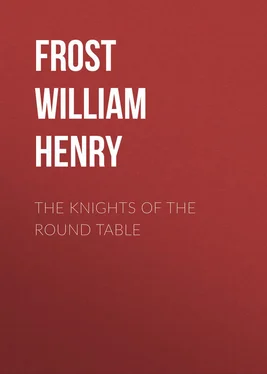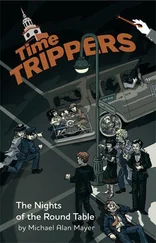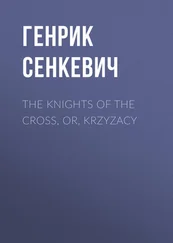William Frost - The Knights of the Round Table
Здесь есть возможность читать онлайн «William Frost - The Knights of the Round Table» — ознакомительный отрывок электронной книги совершенно бесплатно, а после прочтения отрывка купить полную версию. В некоторых случаях можно слушать аудио, скачать через торрент в формате fb2 и присутствует краткое содержание. Жанр: foreign_antique, foreign_prose, на английском языке. Описание произведения, (предисловие) а так же отзывы посетителей доступны на портале библиотеки ЛибКат.
- Название:The Knights of the Round Table
- Автор:
- Жанр:
- Год:неизвестен
- ISBN:нет данных
- Рейтинг книги:3 / 5. Голосов: 1
-
Избранное:Добавить в избранное
- Отзывы:
-
Ваша оценка:
- 60
- 1
- 2
- 3
- 4
- 5
The Knights of the Round Table: краткое содержание, описание и аннотация
Предлагаем к чтению аннотацию, описание, краткое содержание или предисловие (зависит от того, что написал сам автор книги «The Knights of the Round Table»). Если вы не нашли необходимую информацию о книге — напишите в комментариях, мы постараемся отыскать её.
The Knights of the Round Table — читать онлайн ознакомительный отрывок
Ниже представлен текст книги, разбитый по страницам. Система сохранения места последней прочитанной страницы, позволяет с удобством читать онлайн бесплатно книгу «The Knights of the Round Table», без необходимости каждый раз заново искать на чём Вы остановились. Поставьте закладку, и сможете в любой момент перейти на страницу, на которой закончили чтение.
Интервал:
Закладка:
"'Bors, Bors,' said the old man again, 'do not think that you can frighten me with loud talk. In the strength of his arm and the sureness of his spear and the power of his sword, Lancelot is the best knight that lives, but, for all that, he is not so good a knight as you, Sir Bors. Bors, what did you, and what did Lancelot swear when King Arthur made you knights of his Round Table?'
"'We swore,' said Bors, 'that we would help the King to guard his people, that we would do right and justice, that in all things we would be true and loyal to God and to the King.'
"'Yes, Bors,' said the old man, 'that was what you swore, and have you kept your oath, both by your deeds and in your heart?'
"'As far as God has given me power,' Bors answered, 'I have kept it.'
"'Yes,' said the old man, 'you have kept it well. But how has Lancelot kept it?'
"'Old man,' said Bors, 'do you dare to say to me, Lancelot's cousin and his friend, that he has not kept his oath?'
"'Bors, Bors,' said the old man again, 'do not try to frighten me. I dare to tell you anything that it is good for you to know. In all his deeds Lancelot has kept his oath, but how has he kept it in his heart? Go and ask him. Ask him if in his heart he has always been true and loyal to the King. Ask him if he has never grown proud of his strength. Ask him if he has not sometimes done his deeds for the Queen's praise, and not for the King's love and the King's glory. Ask him if he has never wished that he himself were such a king, with such a queen. Ask him if that wish was all true and loyal to the King. Bors, Bors, out there in the world, where you and Lancelot live, the strongest knight is the best, and Lancelot is the best knight – out there in the world. But this is the castle of the Holy Grail, and the Holy Grail searches the hearts of men. Here, in this chamber, Sir Bors, Lancelot could not stay as you have stayed and see what you have seen and bear what you have borne.'
"As the old man ceased to speak it seemed to Bors that the burning of his wounds grew less. While he was thinking of this and of what the old man had said, the old man was gone, he could not tell where. Then, he could not tell from where, the white dove flew into the room. It was the same dove that he had seen in the hall, and it held the same little gold censer in its beak, and again there was the sweet odor through the room. And when the dove came the storm was ended. There was no more blinding lightning and the thunder sounded only a little and far off. The rain ceased and all the wind died down.
"Then Bors saw four children pass through the room, carrying four lighted tapers. With the four children was a figure like an old man. It wore a long, white robe, and a hood hung low down over the face, so that all that Bors could see of it was the end of a white beard. In the right hand was that spear, with the little stream of blood flowing from the point. There was no one to tell Bors who this was, but somehow he seemed to know that it was Joseph of Arimathæa.
"They passed through the room, but still Bors could see them in the next chamber. The children knelt around the old man and he held high up in his hands that wonderful thing with the covering of white silk. Again the soft, rosy brightness glowed through the silk, and Bors did not know why it was that when he saw it he felt so peaceful and glad. Then he heard a loud voice that said: 'Sir Bors, leave this place; it is not yet time for you to be here.'
"Then all at once the door was shut and Bors could not see the children or the old man or what he carried. The strange, bright light that had shone upon him all this time was gone. Outside the storm and the clouds were past, and a clear ray of moonlight shone through the chamber. All the pain of his wounds was gone and he sank back upon his pillow and slept.
"When he awoke in the morning it seemed to him that he had never felt so strong and fresh. The wounds that he had had from the spear and the arrows had left no scar. And when King Pelles saw him he said: 'Sir Bors, you have done here what few living knights could do, and I know that you will prove one of the best knights of the world.'
"Then Bors remembered that the voice had told him that it was not time yet for him to be in this place, so he took his horse and rode away toward Camelot, to find Lancelot and to tell him what he had seen."
CHAPTER II
One of the strangest things about this kind of travel is to find how much more you know about the country than the people do who live in it. Before we came to England at all I had read in certain books that the real Camelot was in the county of Somerset. It was at Camelot that King Arthur lived more than anywhere else and where he had his finest castle. So of course we were anxious to see Camelot. Our trouble did not seem to be that we could not find it; it was that we found it in too many places. We had been to Camelford, a poor little village in Cornwall, earlier in our journey, and they had told us that that was Camelot. We did not really believe it, but neither did I feel quite sure that my books were right about the place in Somerset. We thought that it would be best to see all the Camelots, so that we could make up our minds which one we ought to believe in, or whether we ought to believe in any of them at all.
I had studied the books and I had studied the maps, till I almost felt that I could go straight to this Camelot, without any help. It was still called Camelot, it seemed, and it was a fortified hill, near a place called Queen Camel, some dozen miles to the south of Glastonbury.
It was lucky that I knew all this, because when we asked the people of the hotel in Glastonbury if they could give us a carriage and a driver to take us to Camelot they said that they had never heard of any such place. They had heard of Queen Camel. They did not know just where even that was, but they thought that it might be found. I felt so sure that the books and the maps and I were right about it that I told them that we would take the carriage and go to Queen Camel, and then we would see if we could find Camelot. No doubt they thought that we were insane, but that made no difference to us, and as long as we paid for the carriage it made no difference to them.
Helen's mother is one of those dreadfully sensible people who always want you to take umbrellas and things with you. She was not going with us to discover Camelot, but she said that we must take umbrellas and mackintoshes with us, because it was going to rain. It is always hard to argue with these people, because they are so often right. This time we really had no excuse for not taking them, for they would simply be put in the bottom of the carriage and they would be no trouble. So we took them, and we were scarcely outside Glastonbury before we found that this was one of the times when Helen's mother was right. For then it began to rain. The driver had taken the way that he thought was toward Queen Camel, and we were riding across a great stretch of low, level land. The wind swept across it, and the rain came at us in sheets. We didn't mind it much, with our mackintoshes on, but I did think that it was fair to ask Helen what she thought of the poet who said that this Avalon was a place "Where falls not hail, or rain, or any snow."
"Maybe it is," she answered, pulling her water-proof hood down so that scarcely a bit of her could be seen, except the tip of her nose; "this rain doesn't fall; it just comes against us sideways." So the poet's reputation was saved.
It could not rain so hard as this very long, and by and by it stopped altogether. Then it began again, and there were showers all day. Sometimes it looked as if it were going to stop for good, but we could scarcely get our waterproofs off before it began all over.
Читать дальшеИнтервал:
Закладка:
Похожие книги на «The Knights of the Round Table»
Представляем Вашему вниманию похожие книги на «The Knights of the Round Table» списком для выбора. Мы отобрали схожую по названию и смыслу литературу в надежде предоставить читателям больше вариантов отыскать новые, интересные, ещё непрочитанные произведения.
Обсуждение, отзывы о книге «The Knights of the Round Table» и просто собственные мнения читателей. Оставьте ваши комментарии, напишите, что Вы думаете о произведении, его смысле или главных героях. Укажите что конкретно понравилось, а что нет, и почему Вы так считаете.












